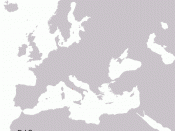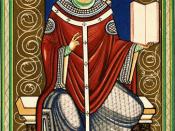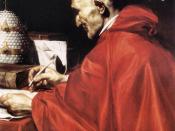How effectively did Pope Gregory The Great Combine his vocation as a monk with his duties as an office holder in the Roman Empire?
Gregory The Great, according to Arthur L. Frothingam, in his book "The Monuments of Christian Rome" describes Gregory's life as a monk at St. Andrew's monastary as "the happiest years of his life." His nomination as Pope however, tells us he "was terrified at the news and even meditated flight. He was seized, however, carried to the Basilica of St. Peter, and there consecrated pope on 3 September, 590." However, his actions as a Pope demonstrate not only that he managed to combine his vocation as a monk with his duties as an office holder in the Roman Empire, but that he actually used his post as a monk and then pope, to positively contribute to his duties as an office holder in Rome - "serving the people" , according to Historia Francorum, by Arndt and Krusch.
The Catholic Encyclopedia tells us that Gregory provided for "the temporal needs of the people," and regarded "the pope and the emperor, each supreme in his own department, care being taken to keep these as far as possible distinct and independent." However at the same time he saw the two together working as a whole. This perhaps forms the core of his effectiveness as both Pope Gregory The Great (between 590 and 604) and an office holder in the Empire. Yet because Gregory effectively held two posts - that of the pope and also within the government, it afforded him a unique position to do both, and use it for good. The effectiveness of this combination therefore, can only be viewed through his actions and their outcomes.
We can first examine his ability as an office holder...


